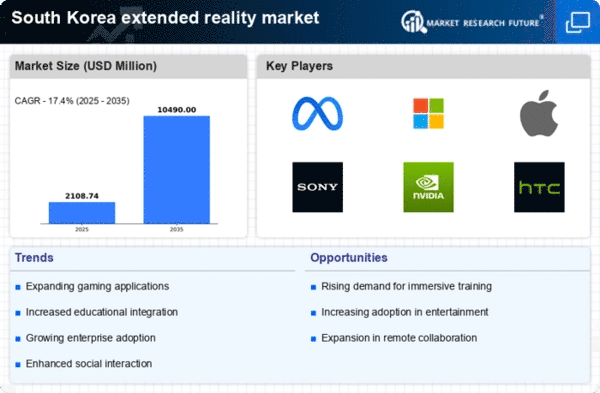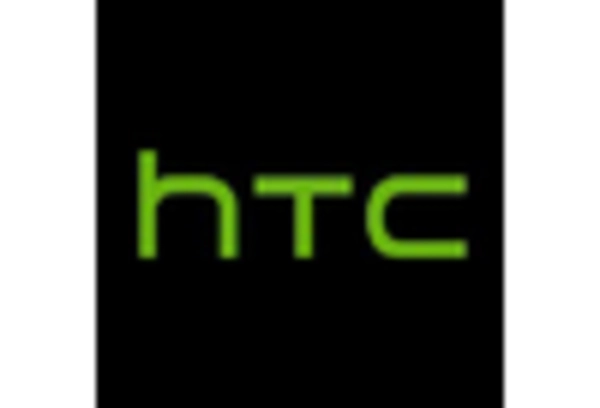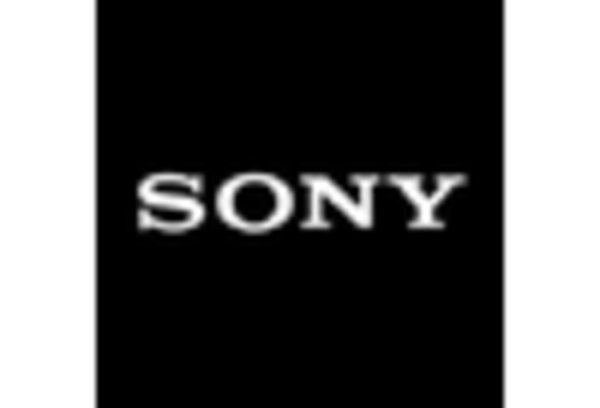Increased Adoption in Retail
The retail sector in South Korea is increasingly adopting extended reality technologies to enhance customer engagement and improve shopping experiences. Retailers are utilizing augmented reality applications to allow customers to visualize products in their own environments before making a purchase. This trend is supported by data indicating that approximately 60% of consumers in South Korea are more likely to purchase products after experiencing them through augmented reality. The extended reality market is thus witnessing a shift in how retail businesses operate, as they invest in immersive technologies to attract and retain customers. This adoption is expected to continue growing, driven by consumer demand for innovative shopping experiences.
Expansion of 5G Infrastructure
The rollout of 5G technology in South Korea is poised to have a transformative impact on the extended reality market. With its high-speed connectivity and low latency, 5G enables seamless streaming of high-quality virtual and augmented reality content. This technological advancement is likely to enhance user experiences significantly, making immersive applications more accessible to the general public. As of November 2025, it is estimated that over 80% of urban areas in South Korea have access to 5G networks, facilitating the growth of the extended reality market. This infrastructure development is expected to drive innovation, as developers create new applications that leverage the capabilities of 5G, further expanding the market.
Collaboration with Gaming Industry
The synergy between the gaming industry and the extended reality market in South Korea is becoming increasingly pronounced. Game developers are integrating virtual and augmented reality elements into their offerings, creating more engaging and interactive gaming experiences. This collaboration is supported by a robust gaming culture in South Korea, where gaming is a significant part of entertainment. Recent statistics suggest that the gaming sector is projected to reach a market value of $10 billion by 2026, with a substantial portion attributed to extended reality applications. The extended reality market is likely to benefit from this trend, as gaming companies continue to explore innovative ways to incorporate immersive technologies into their products.
Government Support and Initiatives
The South Korean government is actively promoting the extended reality market through various initiatives aimed at fostering innovation and development. This includes funding programs, tax incentives, and partnerships with private sector companies to enhance research and development in immersive technologies. The government's commitment to becoming a leader in the digital economy is evident in its investment strategies, which allocate significant resources to the extended reality market. For instance, recent reports indicate that government funding for technology startups in this sector has increased by over 40% in the past year. Such support is expected to catalyze growth and attract more players to the market, thereby enhancing competitiveness.
Rising Demand for Immersive Experiences
The extended reality market in South Korea is experiencing a notable surge in demand for immersive experiences across various sectors. This trend is particularly evident in entertainment, where consumers are increasingly seeking engaging content that leverages virtual and augmented reality technologies. According to recent data, the market is projected to grow at a CAGR of approximately 30% over the next five years. This growth is driven by advancements in hardware and software, enabling more sophisticated and realistic experiences. As consumers become more accustomed to these technologies, the extended reality market is likely to see further expansion, with companies investing heavily in content creation and distribution to meet evolving consumer preferences.
















